Mont Saint Michel (Athens)…


The tide of Mont Saint Michel of the Euroleague (OAKA) choked CSKA Moscow, who failed to walk the way to the castle and got lost when the waters rose. Olympiacos (despite the loss in Istanbul) and Panathinaikos are within reach of home court advantage and Greek basketball is ready to make some noise, like old times, with the playoffs on their way. Hoopfellas analyses.
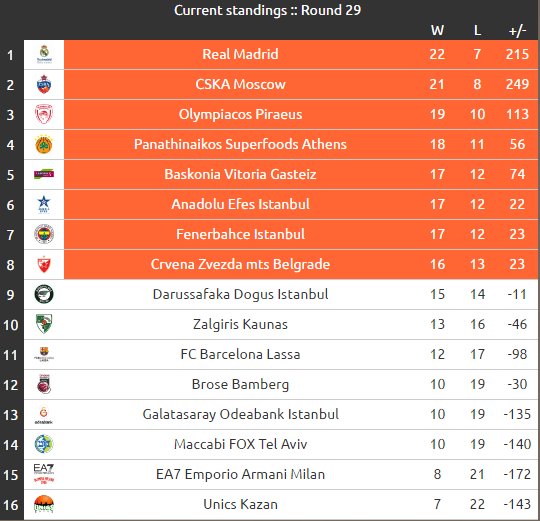
The Abbey of Mont Saint Michel…

In one of the best games of the past years in every level (tension, tactics, and competitiveness, change of scores) Panathinaikos beat CSKA after a very hard bra de fer, reached 14-1 in their OAKA castle and are now alone in 4th, just one game before the end of the regular season. That’s the reason for them being compared to the Normandy islet…
I am fully aware of what I am writing… The most important thing Panathinaikos won on Friday night, more important that the win and gaining home court advantage, was the belief – which became a certainty – that they found the man who would lead them in the new era. They can depend on him and start building their return to the exclusive club of the European elite, that is, where titles are decided in a game of poker during a weekend. Regardless of the result, Pascual was again impeccable in every level (preparation, reflexes, management) in the match against the reigning European champions. He did his very best, he took the match exactly where he wanted it to go. Not long ago, we pointed out Pascual’s effort to go for the sure things in order to be within range in the competition’s standings. If that happened, and when approaching the last games, Panathinaikos would need their coach in order to take the large leap that would “lift them up”. He would be the one they turned to. That is exactly what they did. The “Clover”’s return to the top 4 of the regular season and gaining the home court advantage will be a great success for the Spanish coach.
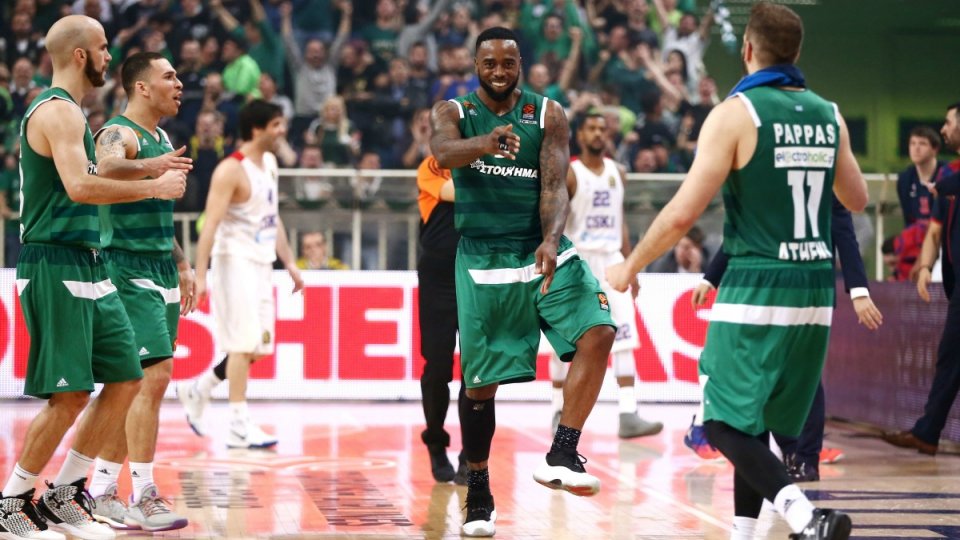
As in Victoria, Panathinaikos got very close to what we all had in mind in the beginning of the season for this group of players. Do you remember Hoopfellas’ advice for the Greens, after Gentile left? We said that it is a one way street to focus on the defensive part, returning to the compact – more conformist for this period – character with Nichols as a starter so they could reach as close as possible to the non stop motor team that can make a difference in the spring. Against CSKA we saw these attributes from Pascual’s team that, with Gist’s return, is without doubt one of the strongest one on one teams both in offense and defense. This (one on one ability) is where close games are decided in their last minutes.
CSKA Moscow’s defence (regarding its nature, abilities, and its level of cooperation and automatisms) is maybe the best test today in Europe in order to assess your defence in total and, more specifically, to test you times in the levels of rotation and defensive cooperation. It is an offense that makes the defense play to the limit for 40 minutes, as the individual skills of certain players may expose in the minimum of time every lack of focus, with their sensor being the same interactive nature and their high level of decoding. Panathinaikos kept this offense at 73 point in the 40 minutes of regulation time. Studying on by one these defensive plays of the Greens in these 45 minutes, I came to the conclusion that Panathinaikos could have done better. Their reflexes, their readiness against CSKA’s famous half court fast breaks (the best execution in Europe) by taking the ball to the side and immediately attacking with an extra player after a breach or Pick & Roll action is good, but could have been better. Reality states that the Greens may cover a small lack of movement in automatisms in defensive rotations, a bit later in the final attempt, taking advantage of their athleticism and the quickness of their big men.
– I think that anyone that’s really watched the way CSKA’s offence functions in the Itoudis era in Moscow can understand that what has shifted the balance in the court was Andrea Vorontsevich’s missed shots behind the arc; these shots – that were far from riskless – were chosen by the Panathinaikos defense when Bouroussis was on the court. I have to be honest to you, I would personally be very uncomfortable with such a choice, but I understand why the coach had to “drag” Singleton towards the middle lane (in every PnR action of the Russians, in order to cover Bourroussis’ slow feet) and ask him to “sprint for his life” to the arc when the ball reached his almost uncovered side. This is a situation where 9/10 times, CSKA punishes their opponent, and punishes them hard… However, Singleton’s effort was excellent.
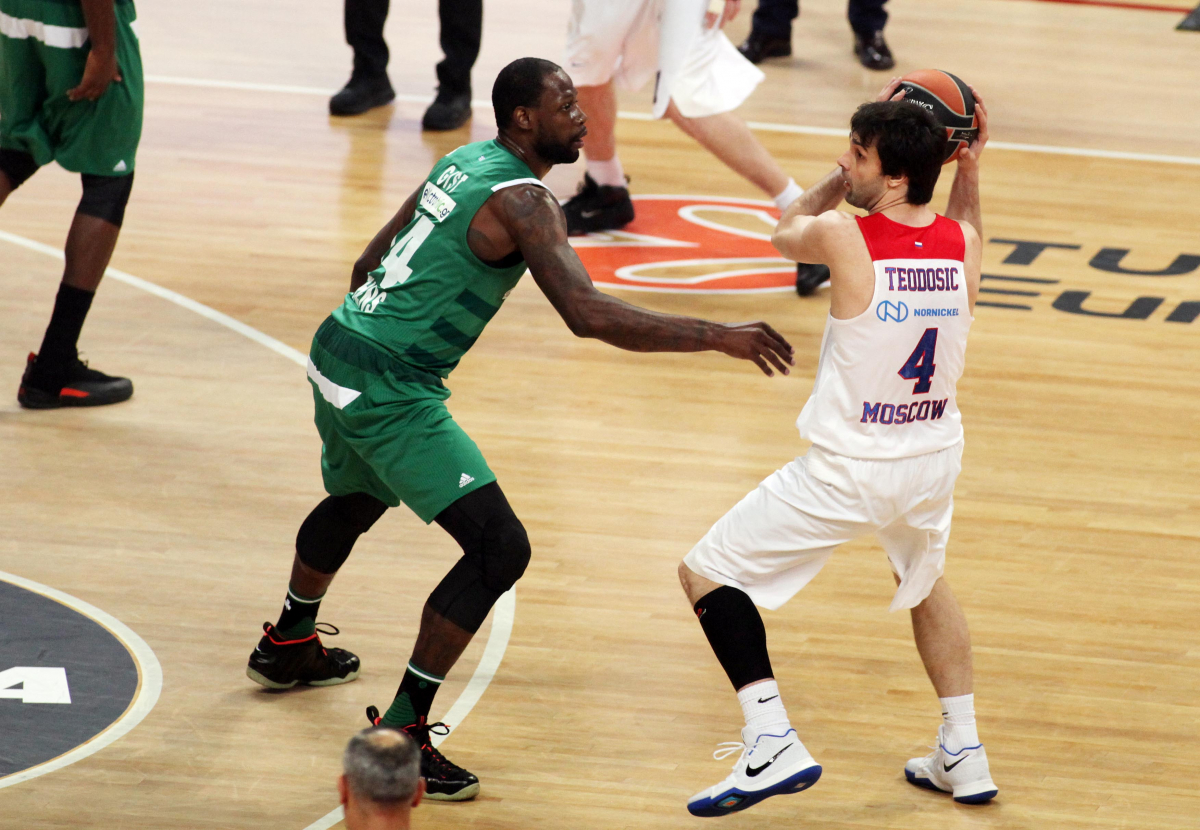
Coach Pascual chose Hard Hedge against De Colo in the main pick in order to stop the penetration of such a talented slasher. What makes it more difficult for most coaches is the Frenchman’s ability to pass the ball very well and at the right time. When Hines takes the main lane, the Russians use short rolls and base line cuts (a natural continuation) in the back of the defence, but the good use of his hands and the readiness of the player (Nichols was important in these situations) prevented the “Bear” from feeling comfortable by using this choice. With the ball away from Teodosic- DeColo, Pascual chose mainly to Show and Recover in the side picks, with the guard committing to the big man as less as possible, but look to recover to the ballhandler as fast as possible.
– Dimitris Itoudis tried to decompress his stars in the hope that they would enter the game in the suitable moment; however, the home team defense has closed the valves of the two most key production sources: Transition offense (great running and readiness by the Greens, only 6 points from transition from the fastest paced EL team) and weak side offense (a derivative of PnR action). This is when doubt entered the minds of the Russians, which led to 8 turnovers from the 27th minute on. The Russians started the game with two playmakers (Teodosic-Khryapa), two screeners/cutters (Hines-Kurbanov) and De Colo’s off ball game, and run the corresponding (for each occasion) part of their offensive playbook against a very aggressive defense. With the 2-3 High Set entry formation, which would end up in 1 in 4 out for De Colo (Khryapa-Teodosic were the only ones that put the ball in the paint) set Feldeine off the game. In Horns offense, the well known Hand off (a trademark) situation, which is followed with great timing by PnR and Baseline cuts, was difficult for Gist. CSKA tried, with Higgins as the main ballhandler (an agile slasher and shooter after dribbling) to attack on Bouroussis, by working on 2 on 2 situations in a wide range of their offense, and scored points from the exceptional in catch and finish game in the paint, Augustine.
On defence, the “Bear” chose hedging in the side picks of Calathes-Gist, trying to avoid “switching” in the beginning and led to miss matches with Teodosic defending in the low post. Their main objective (especially when Hines was not on the court) was to deny the main lane to Panathinaikos’ ballhandlers. Within this scope (of trying to lock down the main lane) he also used a 1-3-1 match up zone with Kurbanov on the top of the formation, and against Pascual’s Box-1 (Calathes on Teodosic) he used Kurbanov on the corner and run plays against a 1-3-1 formation.
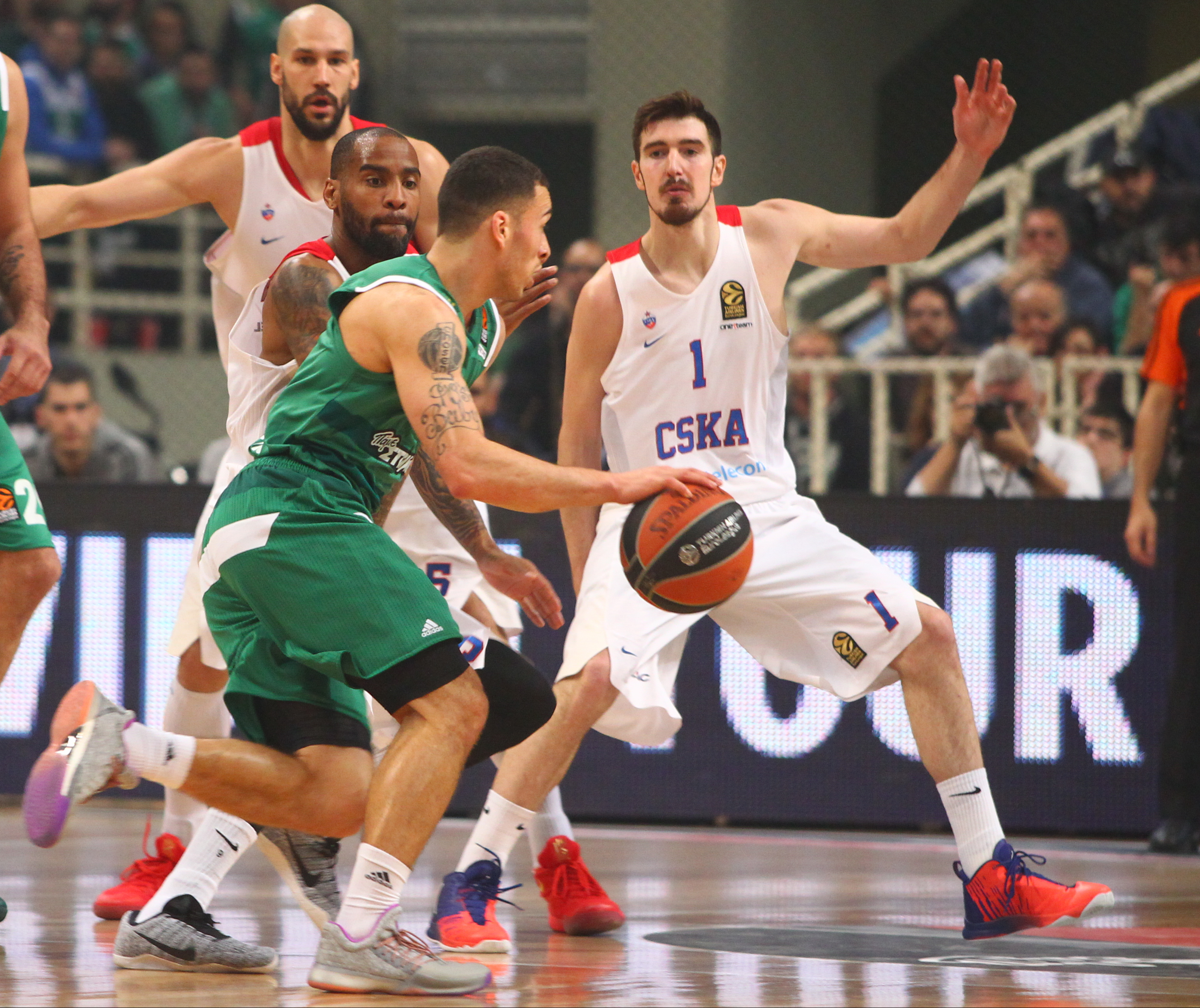
On offense, Pascual went to more certain things and tried to make the most out of every possession. He started by betting on Gaggle Screen situations (the first screener in a stagger formation cutting to the opposite side, usually Singleton) in 1 in -4 out format or even with 5 players playing outside the paint. We also saw Flex for Rivers with the second option being Bouroussis’ post up, and in the second half he insisted on keeping Singleton-Nichols (and with them Hines-Kurbanov, the best CSKA defenders) on the corners and play with the trio of Calathes (ballhandler)-Rivers (shooter/slasher/alternative ballhandler)-Gist (screener/diver) on the main lane against the trio Teodosic-Higgins-Khryapa.
On an individual level, now… Nick Calathes gets my vote for the “best defensive player of the year” award. We ‘ve seen enough… His footwork was once again exceptional, as was the way he managed himself and fluctuated his aggressiveness on defense, by decoding the level of danger. Only Birch would on the same level as him (objectively, without any fake patriotism) and after them Hanga. Pappas was also very important and had great effort, especially on the defensive part (he matched De Colo by being as aggressive as he should against CSKA’s defense), but it was the killer instinct of Rivers and mainly (despite his turnovers) the high energy level of James that made the difference again. The former Baskonia guard had a great defensive game and he would “sting”, even when he found himself defending on the post. The steady hands of Singleton-Rivers provide safety to Panathinaikos’ offence, however it is James’ game that makes their offense more unpredictable and harder to face all year long…
A very interesting table (overbasket.com) for the total +/- of the Panathinaikos and Olympiacos players this season. Food for thought, as it can be read in various ways…
+- Panathinaikos
Full season +|- stats: Calathes:+111 Singleton:+106 Rivers:+81 Nichols:+45 Gabriel:+44 Fotsis:+34 Feldeine:+19 James:+10 Pappas:-5 Bourousis:-66
+- Olympiacos
Full season +|- stats: Mantzaris:+151, Papanikolaou:+150, Spanoulis:+87 Birch:+74 Milutinov:+61 Printezis:+37 Papapetrou:+37 Green:+22 Lojeski:+1 Young:-26
Thoughts for Olympiacos
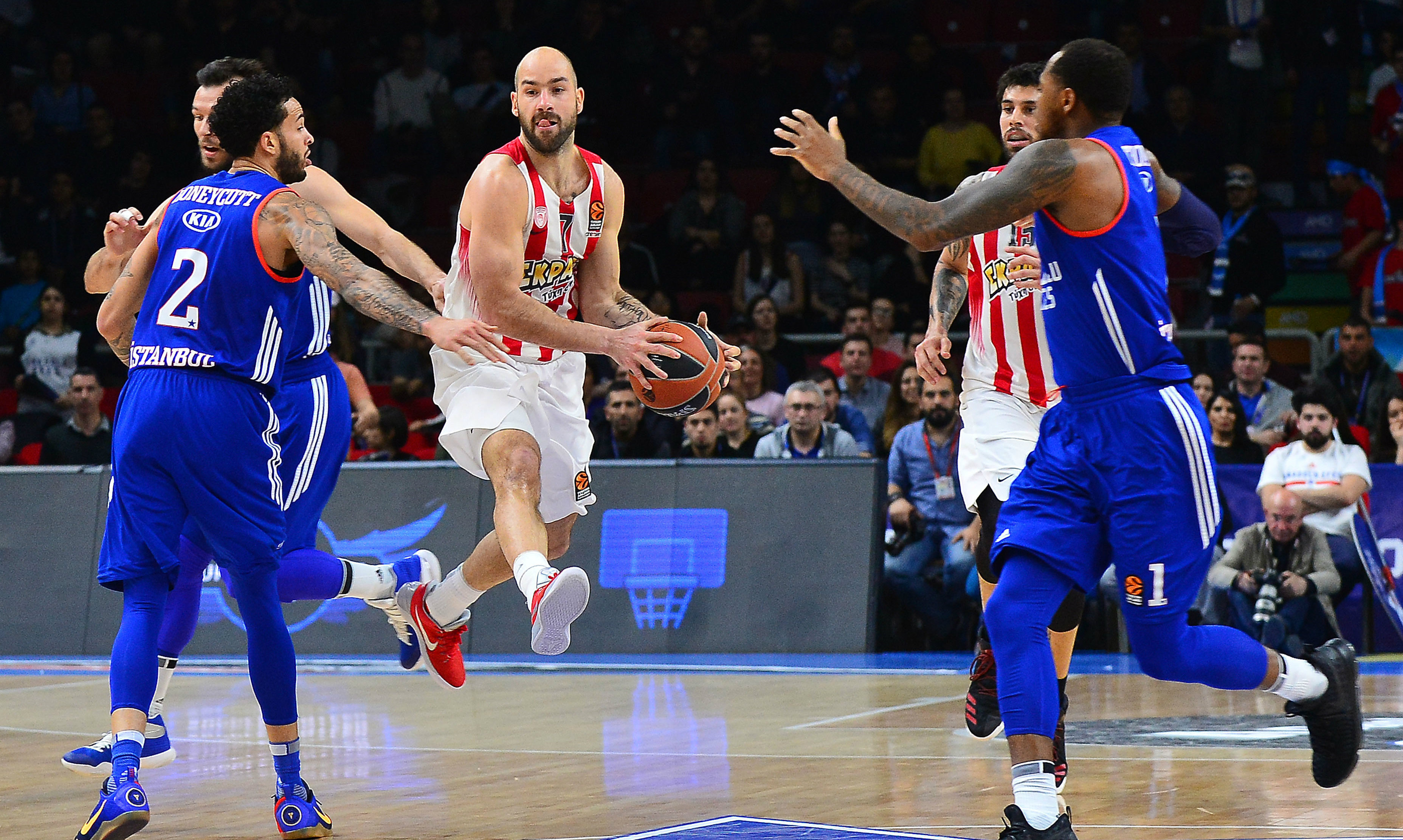
Let’s move on to Olympiacos… It is completely understandable that with the third place guaranteed and the recent injury trouble bringing changes to the rotation, the Reds would use – to a certain extent – the last difficult games to regroup and adjust their team to different situations. However, I am not certain of how they have set their priorities in this small period we have until the end of the season… Behind all this laid back atmosphere regarding the result and in conjunction with the point of the season we are in, I believe that there are concerns. Olympiacos has to manage the problems that have been piling up, and they have to do it now! Even if most are laid back, as “Olympiacos will be ready when it matters the most”, I feel that the Reds need a wakeup call. Here are some thoughts…
-How you wrap up the regular season is always important. The emotions and last images imprint on your subconscious and, quite often, their well-hidden remnants can accompany you to the different journey of the next phase. I must confess that Olympiakos’ performance troubles me recently; the gaming issues they have to tackle aside, there lies the danger of complacency just outside (?) their door. The Reds have lost 3 out of their last 4 matches. It is possible to finish the season with 4/5(at Moscow for the last round). No, I don’t like this one bit. Unlike the switch on the wall, the brain switch is not easy to turn..
-In Istanbul, Olympiakos lost a match whose pace they essentially controlled. Their transition defense was satisfactory and their opponents shot 4/17 three pointers, two pieces of evidence that lead to the conclusion that they obliterated the intense periods where the hosts, by their own nature, attack the opponent defense in waves, which enables them to score several points in a short time. Giannis Sfairopoulos’s team lost the match “in their own court”. They forced the opponent to go to half court and attack one on one, however, they lost fair and square in their strong point..
This year’s team of the Reds has been built to remain standing on one on one duels, especially on defense. Through the entire season, Olympiakos has locked the middle lane and the paint, mainly with Birch but also with Yiannis Sfairopoulos’s choice to put Kostas Papanikolaou at the head of the first line of defense, adding length and athleticism that makes it difficult for the guard who is involved in the final attempt. Watching (the insurmountable throughout the season) Birch recently losing one on one duel after duel and conceiving points that are inconceivable for his defensive pride, is a point for concern…
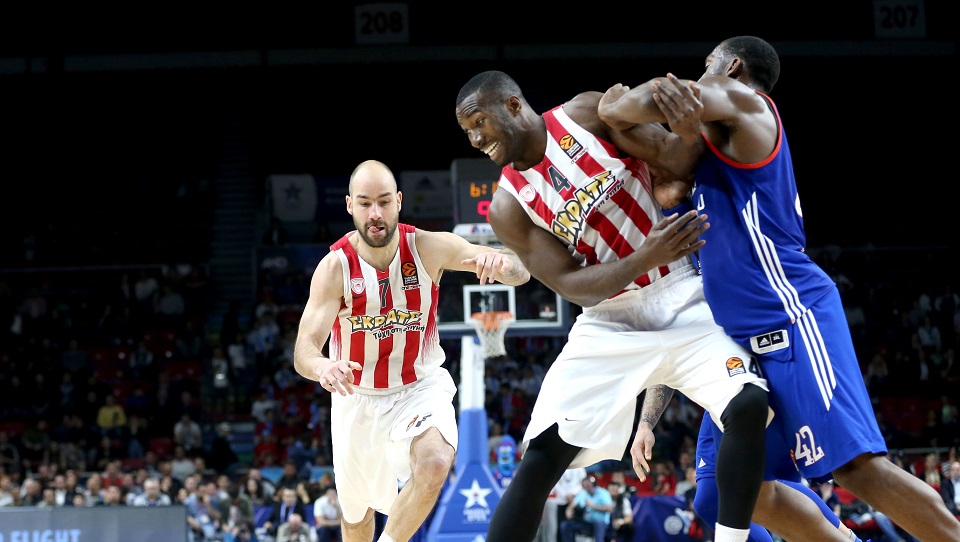
-Anadolu killed Olympaikos by targeting the heart of their defense. The Turks scored almost 60% of their points from inside the paint. That’s hard for the defensive intelligence of the Greek team.. Armed with Thomas Heurtel, Velimir Perasovic set high, at 9-10 meters, Pick & Roll situations skyrocketing Young’s disadvantage at the agility level. It is clear that the former Gator’s back steps and body control are not at the level suggested by the rest of his athletic package. See the result..
We didn’t see the usual Double drag from the Frenchman (photo)..
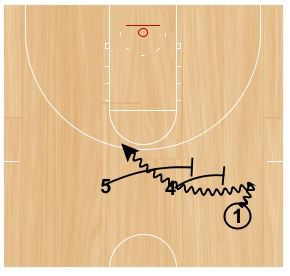
..or the early picks (except for two cases) that open up the lane in transition but, on the contrary, good spacing (even though the Turks weren’t in a good night as far as behind the arc shooting goes) that Anadolu took advantage of when they went Small (Kirk was absent) with Brown on “5” and Thomas-Honeycutt next to him. The UCLA forward in particular was excellent in both lines of the court, managing very well the miss match with Spanoulis in the low post..
3-Guard Lineup in the horizon..
Printezis and Spanoulis were quite good and this is definitely on the positive side of the Istanbul match. The captain of the Reds may had been off-target (4/15 FG), however, he finished the game with the impressive 10/1 in AST/TO in a time period where (especially with the –partial or total, we ‘ll see- absence of Lojeski from the playoffs) the offense of the team will be tightly wrapped around him and Printezis. This is a one on one team and they are its main productive pillars. It is a prerequisite that they are in the desired state.
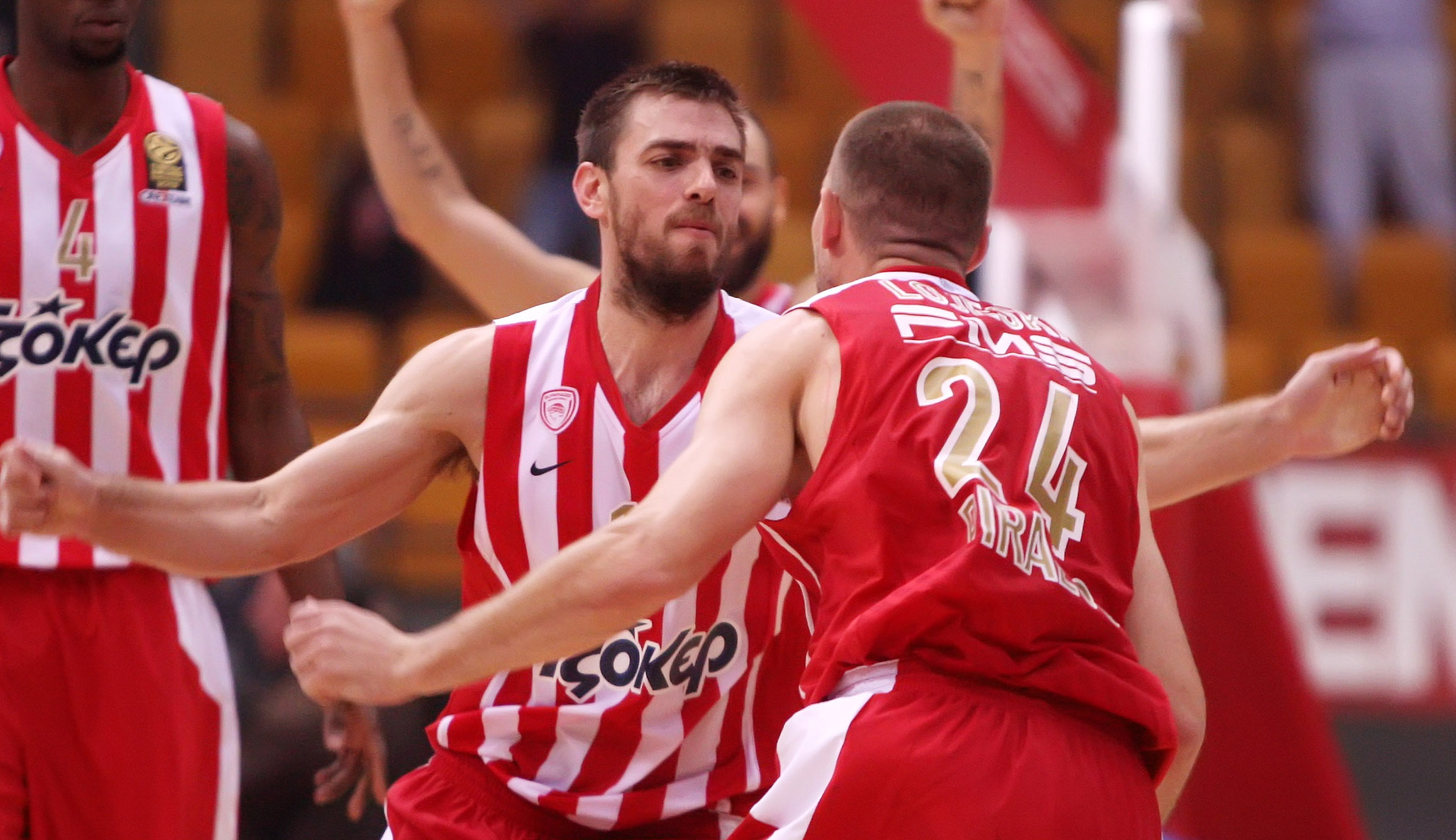
Lojeski’s possible absence (at least at the beginning of the playoffs) triggers off chain reactions in the horizon rotation-wise. The sensible “adjustment” (regardless of what the opponent’s nature, who we will know next week, will require) was the move of Papapetrou’s heavy minutes in “3” with Agravanis as a back up to Printezis. It is somewhat untimely (when you don’t know the opponent, I repeat), but filtering the way Olympiakos’ offense functions, I think that it will require 3-guard lineups that will make the team more flexible with the ball and maybe more creative, within the meaning that the two available Sfs are not known for their ability with the ball. We will take a closer look to that in a few days and depending on what the last round will bring. In this direction, Giannis Sfairopoulos will definitely need a comeback fromVaggelis Mantzaris (he is shooting 5/37 three pointers in the last 7 matches). He is the guard whose defensive ability in the post can support such formations, while at the same time, he is a key factor to maintain correct spacing, a significant parameter for the performance of Spanoulis-Printezis. So, patience until next week, but…
..let’s be honest. A possible series against Fenerbahce, under these circumstances, sets us up for one of the most epic series in the history of the competition..
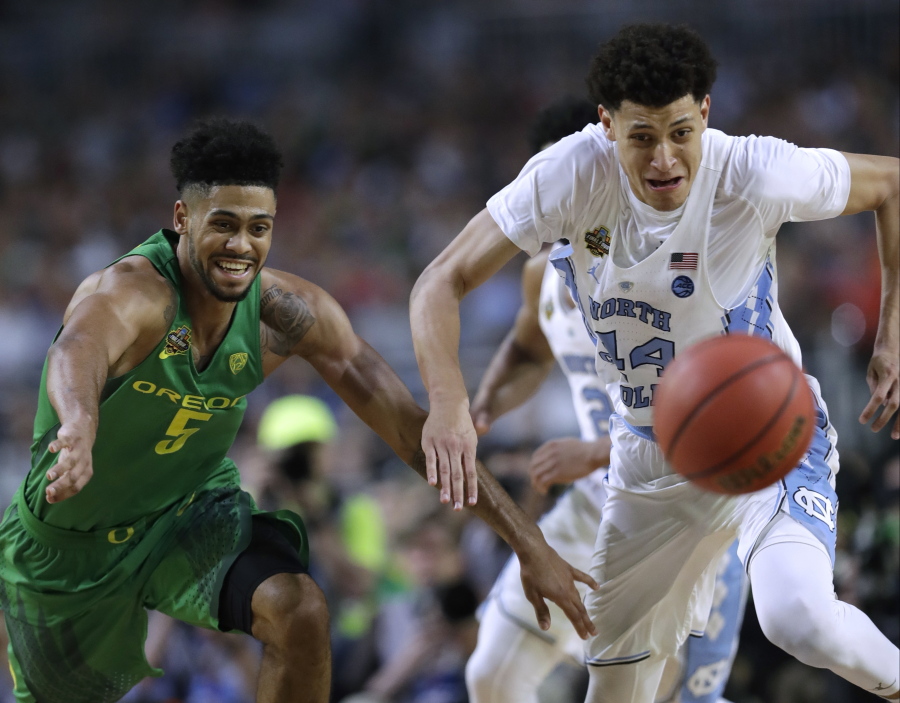
P.S.: Rebound, “length” of the guards. As above..
P.S.1: A Darussafaka-Crvena Zvezda match with the prize of qualifying for the playoffs in the last round would give extra suspense and a tension bonus to the league..
Translated by: George-Orestis Zoumpos
Jim Conway


